Worried about picking the right sunscreen that suits your skin type? Don’t worry – we’re here for you, sun seekers!
Sunscreen shields the skin from the harmful effects of ultraviolet rays, making it an essential element of any skincare routine. However, it might be tough to pick the best sunscreen due to the availability of so many products in the market. We will discover the subject of sun protection in this blog and offer you helpful tips on choosing the right sunscreen for your skin type. From understanding SPF to interpreting sunscreen elements, we will help you make a smart choice and ensure your skin stays safe and protected from the sun.

The Basics of Sunscreen
Before getting into the specifics, let us discuss some sunscreen basics. Sunscreen is your shield against the sun’s ultraviolet (UV) rays, which come in two primary forms: UVA and UVB. UVA rays enter deep into the skin and cause long-term harm, like wrinkles and early aging, while UVB rays are accountable for that horrible sun tan. A good sunscreen protects you by reducing the risk of skin cancer and keeping your skin younger-looking.
Decoding SPF
You might have seen SPF numbers extending from 15 to 100 on sunscreen bottles, but do you know what it all means? SPF stands for Sun Protection Factor and mainly measures a sunscreen’s power to block UVB rays from entering the skin. The lowdown is as follows:
- SPF 100 – Blocks approximately 99% of UVB rays.
- SPF 50 – Blocks approximately 98% of UVB rays.
- SPF 30 – Blocks approximately 97% of UVB rays.
- SPF 15 – Blocks approximately 93% of UVB rays.
Opposing the common belief, SPF doesn’t equate to the number of hours you can stay under the sun. It shows how long it takes for UVB rays to redden your skin, similar to not putting sunscreen on at all. For example, if you generally get sunburned in 10 minutes, SPF 30 supposedly shields you for about 300 minutes (10 minutes × 30 SPF).
Selecting the Correct Sunscreen for Your Skin Type
Now that we have broken down the SPF protocol, let’s delve deeper. Your skin type plays a crucial role in picking the right sunscreen. Here’s a swift overview:
-
Delicate Skin
Fragrance-free and hypoallergenic sunscreens are best for these skin types. Mineral-based sunscreens with titanium dioxide or zinc oxide are less likely to cause irritation. They create a mild physical blockade on the skin without irritating delicate areas.
-
Oily or Acne-Prone Skin
Look for oil-free, non-comedogenic (which won’t clog pores) sunscreen formulas to avoid breakouts on the face. Gel-based or mattifying sunscreens are brilliant selections for regulating shine and keeping your skin feeling fresh throughout the day.
-
Dry Skin
Pick sunscreens with hydrating elements like hyaluronic acid and glycerin or lubricants like coconut or argan oil. Ointment or lotion-based sunscreens are generally more nourishing and work as a barrier against moisture loss.
-
Dark Skin
There is a misunderstanding that darker skin doesn’t need sunscreen, but actually, it does! Select a broad-spectrum sunscreen to avoid hyperpigmentation and other harm caused by the sun. Look for lightweight formulas that will not leave a white shade, ensuring your skin looks seamless and even-toned.
Broad-Spectrum vs. Regular Sunscreen
Most experts prefer a broad-spectrum sunscreen because it safeguards your skin against both UVA and UVB rays, delivering complete coverage. It’s better always to pick a broad-spectrum formula to ensure you receive full protection against both types of UV radiation, which can enter the skin at various depths and cause multiple types of harm. Therefore, it is evident that you can benefit more from broad-spectrum sunscreen than regular sunscreen.
Selecting Between Chemical and Physical (Mineral) Sunscreens
There are two main categories of sunscreen preparations: chemical and physical (mineral) sunscreens. Let us take a look at this in detail.
-
Chemical Sunscreens
These sunscreens grasp UV rays and change them into heat, which is then discharged from the skin. They often are lighter and convenient to rub on without leaving a white shade. Make sure to look for ingredients like avobenzone or oxybenzone in your sunscreen.
-
Physical (Mineral) Sunscreens
Produced with active mineral elements like titanium dioxide or zinc oxide, these sunscreens create a physical fence that reflects UV rays away from the skin. They are less likely to irritate delicate skin but can be dense and leave a white filtrate. Perfect for those with delicate skin or those looking for a natural sunscreen choice.

Tips and Tricks for Applying the Sunscreen
Now that you’ve discovered your ideal match, here are some expert tips on applying it to the skin.
-
Reapply Frequently
Sunscreen loses its effectiveness quickly, especially if you are sweating or swimming. Reapply every two hours or soon after sweating too much or swimming. Remember to reapply on parts of the body that are frequently disregarded, like the eyelids, the top of your ears, and the back of your hands.
-
Apply Generously
Don’t be stingy about using the right amount of sunscreen! A shot glass quantity (about 1 ounce) is perfect for covering your entire body. For your face, a nickel-sized spoon is usually enough.
-
Keep the Extras in Mind
Some areas commonly forgotten when applying sunscreen include the ears, lips, back of the neck, and tops of feet. Pamper them with SPF lip balms and sprays. Make sure to use waterproof sunscreen if you will be swimming or sweating to guarantee durable protection.
Busting the Myths of Sunscreen
Before we close up, let us expose some communal myths about sunscreen.
-
Myth 1
You only need sunscreen at the seaside – UV rays are everywhere, even indoors. Make sunscreen part of your day-to-day routine, especially if you spend long hours near windows or in your vehicle. Regular application of sunscreen assists in protecting against the overall harm of UV rays, dropping the risk of skin cancer and premature aging.
-
Myth 2
You do not need sunscreen on gloomy days – UV waves can enter clouds, so sunscreen is essential even on cloudy days. Up to 80% of UV rays can enter clouds, so shielding your skin all year long is important.
-
Myth 3
People with darker skin do not need sunscreen – Wrong! Regardless of skin tone, everybody needs sunscreen to protect their skin against harmful UV rays. While darker skin tones have a more organic defense owing to higher levels of melanin, sunscreen is still essential for preventing skin cancer and untimely aging.
Conclusion
Now that you have this all-inclusive guide, you can easily navigate the sunscreen aisle. Remember, sunscreen is not just for sunlit days at the seaside; it is an essential everyday ingredient for healthy, glowing skin. Find a sunblock that matches your lifestyle, skin type, and SPF requirements, and make it a fixed part of your morning routine.
Therefore, whether hiking in the mountains, relaxing beside the pool, or just walking around town, apply that sunscreen and relax in the sun wisely. Your skin will thank you for it!



